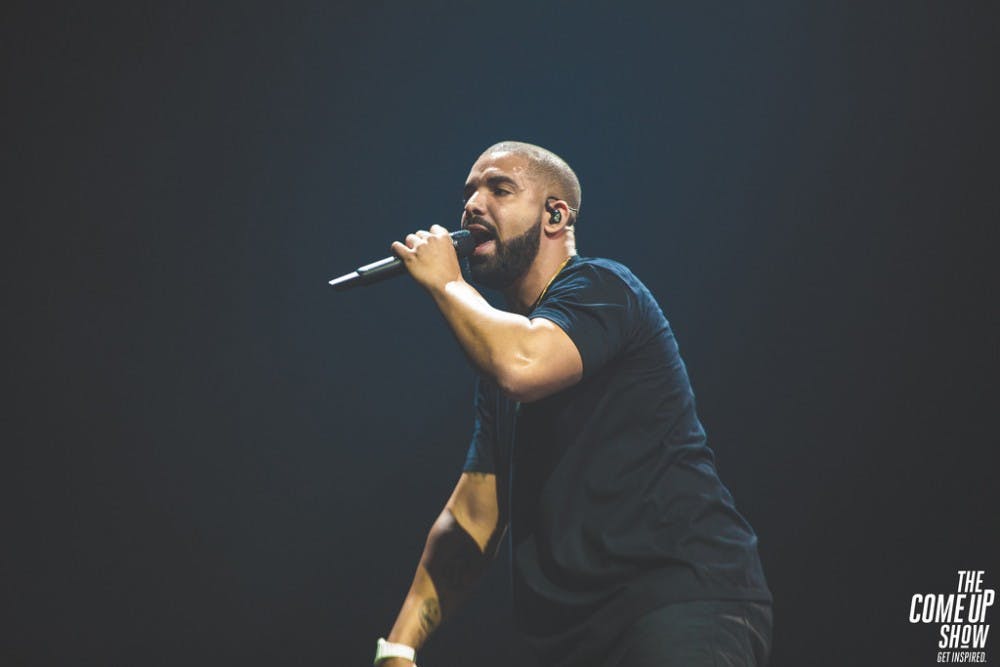To be a pop trendsetter is to have the weight of an industry on your back. Music's biggest pop stars -- Taylor Swift, Adele, Ed Sheeran, Katy Perry--have been taking huge amounts of time crafting new albums, fighting against the tide of copycats and determining which sonic trends are simply fads or the next big thing. Drake doesn't have that problem. His new albums are almost an annual affair, each release breaking streaming records and amassing hordes of fans.
It's interesting, then, that the Canadian music titan rarely enters conversations as a pop star. Ask a college student who their favorite rappers are, and Drake is liable to pop up most of the time. This is a categorization that the musician himself disapproves of. In a recent interview, he said, "The only category that they can manage to fit me in is in a rap category, maybe because I've rapped in the past or because I'm black."
There's not enough space to discuss his (correct) assumption that genres tend to separate white musicians and those of color. But Drake's maneuver into the world of pop music is completed with "More Life," a lengthy, colorful, self-described "playlist" that blends global traditions into a sleek, contemporary package.
After the massively popular yet bloated "Views," "More Life" feels like exactly what the title suggests: a lively and dynamic release that ebbs and flows, switching between different Drake personas with ease. The stretch of songs from "Passionfruit" to "Skepta Interlude" is perhaps the most consistently great in his entire catalogue, full of Afro-Caribbean flare and driving house beats accompanying Drake's trademark Autotuned croon.
Don't worry about losing the Drake that many have come to love. That sad-sack persona continues to mourn about failed relationships and fake friends. The epitome of such heartbreak is "Teenage Fever," which chronicles his failed relationship with Jennifer Lopez by sampling her love song, "If You Had My Love," pitching it down and placing it over gnashing synths and teetering drum machine.
Even though "More Life" offers moments like these, there's still plenty of big trap-infused tracks, including a guest list that's a veritable who's who of stars, like Young Thug, Travis Scott, Migos' Quavo and Kanye West. In that way, it's truly like a playlist because it never feels as repetitive as works like "Views." It's his most experimental, adventurous release since he found his successful sound with 2013's "Nothing Was the Same."
While the A-list guests are fine, the best collaborations on "More Life" come from lesser-known artists. It seems that Drake has taken a keen interest in British music; songstress Jorja Smith gets her own interlude and a highlighted feature on "Get It Together," and excellent electro-soul singer Sampha--whose debut album "Process" is one of the best of the year--writes and sings the entirety of "4422."
Perhaps more interestingly, Drake intersperses influences from grime, the underground British rap-electronic fusion that has never stuck in America. Two tracks feature grime artist Giggs, and the genre's overlord Skepta gets his own interlude. Drake's solo tracks like "Free Smoke" even take some characteristics from the genre. This kind of exposure--coupled with the budding success of Stormzy--could mean that grime could enter America's hip-hop soundscape.
And this example may perfectly encapsulate the spirit of "More Life;" While calling it a playlist seems innocuous at first, its accuracy slowly reveals itself. Clocking in at over 20 tracks and 80 minutes, it's hard to make it through a single, concentrated listen. Like the best playlists, it excels at capturing a mood, accentuating it for a few songs and then shifting tone. It also grabs the big names for attention but puts a focus on smaller acts that deserve a seat among the greatest.
While this is definitely pop music in the sense that there's hardly anyone bigger than Drake, "More Life" works to expand upon American pop and hip-hop as much as the artist himself avoids "rapper" categorization. Operating under the constraints of genre labels that are essentially meaningless and malleable, he still doesn't fit any discernable label.
In fact, Drake's best quality is not as a pop or rap star, but as a trendsetter. As a radio host and record label founder, he is a taste maker, brand and platform in a way that most other pop stars could only dream of becoming. Thanks to "More Life," everything from Sampha to grime could be recognized by mainstream American audiences. It seems like--for Drake, at least--the pop album really is dead. But maybe that's not such a bad thing.
4/5 Stars

